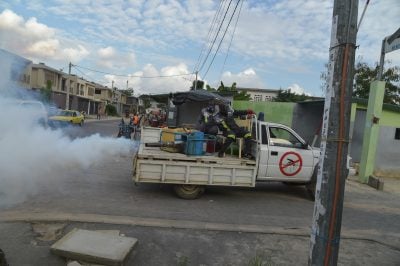While most of Africa’s well-known ventures into e-commerce have been designed to appeal to the continent’s burgeoning middle class, Sokowatch is aiming to bring goods and services to the millions of informal shop owners across the East African region.
Much of the population live on less than two dollars per day, meaning that many are unable to benefit from the ever-expanding range of online delivery and shopping platforms that market higher-end goods and charge fees.
Raising $14m in Series A funding in February, the fast-growing tech company delivers essential goods like oil, rice and soap to over 16,000 informal shops across Kenya, Tanzania, Uganda and Rwanda.
Making the bulk of its money on the margins between the wholesale purchase of items and the sale of those goods to each individual business, the delivery service is free and functions through an app or SMS.
Running a fleet of over 200 delivery tuktuks, the service also reduces costs for small business owners who typically spend money when sourcing goods.
“Shopkeepers no longer have to physically go themselves to wholesale markets, paying for transport to go there and back,” says Daniel Yu, Global CEO.
“In addition to being costly, wholesale shopping in crowded markets is not safe with the ongoing Covid-19 pandemic.”
Throughout the health crisis, most of the region’s lower income families continue to rely on local shops to buy basic necessities – something those with higher wages can prevent through the use of home delivery services.
Offering an e-commerce service to this segment of local shops, Sokowatch – along with many other online services – has seen “a significant uptake in new customers” over the Covid-19 period, according to Yu.
 Finding another use for its platform during the pandemic, the startup has partnered with KCB Bank and several foundations to distribute digital food vouchers worth between $7 and $15 via SMS to thousands of families in need of assistance.
Finding another use for its platform during the pandemic, the startup has partnered with KCB Bank and several foundations to distribute digital food vouchers worth between $7 and $15 via SMS to thousands of families in need of assistance.
The vouchers can be redeemed at Sokowatch-affiliated outlets, helping support local stores while reducing food insecurity for over 10,000 people.
Building on another aspect of its business, the East African firm has continued extending credit lines to its small business customers where most other lenders in the marketplace have dramatically reduced lending as a result of Covid-19.
Having lent more than $1m over the last year, Sokowatch’s CEO believes their unique model allows them to capably de-risk lending without resorting to charging interest rates or requiring collateral.
Shopkeepers have the option to pay when goods are delivered or up to a week later for a small fee.
“We realised that embedding these financial services on top of the existing e-commerce relationship we have with our customers is actually something fundamentally different from a digital lending type of model,” says Yu.
“We are a significant counter example to what is going on with lending in the market. By continuing to supply stores with essential goods we provide a solid foundation for providing credit services.”
Around 15% of Sokowatch’s order book is supported by credit, and although it began as a value-added service alongside its core business the startup is beginning to focus more of its attention on creating various financial products for its customers, Yu says.
Most of the money raised at the beginning of the year will be used to increase the profitability of its core business and to invest in financial services.
Though its presence in multiple countries allowed Sokowatch to offset the loss of revenue in some areas due to quickly changing lockdown regulations, Yu cautions against using the funds to expand into different markets during a pandemic.
That said, securing a relatively large ticket size in only a number of years the next round of post-Covid funding will probably see the firm looking to scale across the wider region and to even greater potential beyond.
In East Africa alone, the size of the essential goods market in the informal sector is around $180bn increasing to $600bn throughout the rest of Africa, Yu estimates.
“It is the largest sector of consumer spending in the economy,” he says.
“With the limited budget of the average consumer the vast majority of spending is focused on basic necessities.”
Want to continue reading? Subscribe today.
You've read all your free articles for this month! Subscribe now to enjoy full access to our content.
Digital Monthly
£8.00 / month
Receive full unlimited access to our articles, opinions, podcasts and more.
Digital Yearly
£70.00 / year
Our best value offer - save £26 and gain access to all of our digital content for an entire year!
 Sign in with Google
Sign in with Google 


